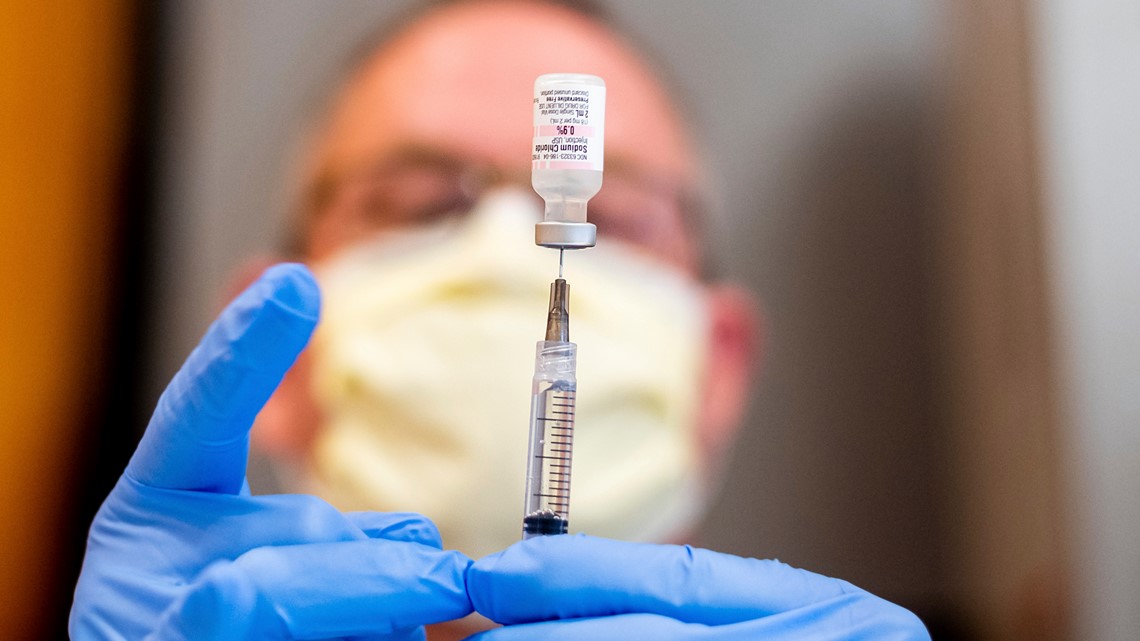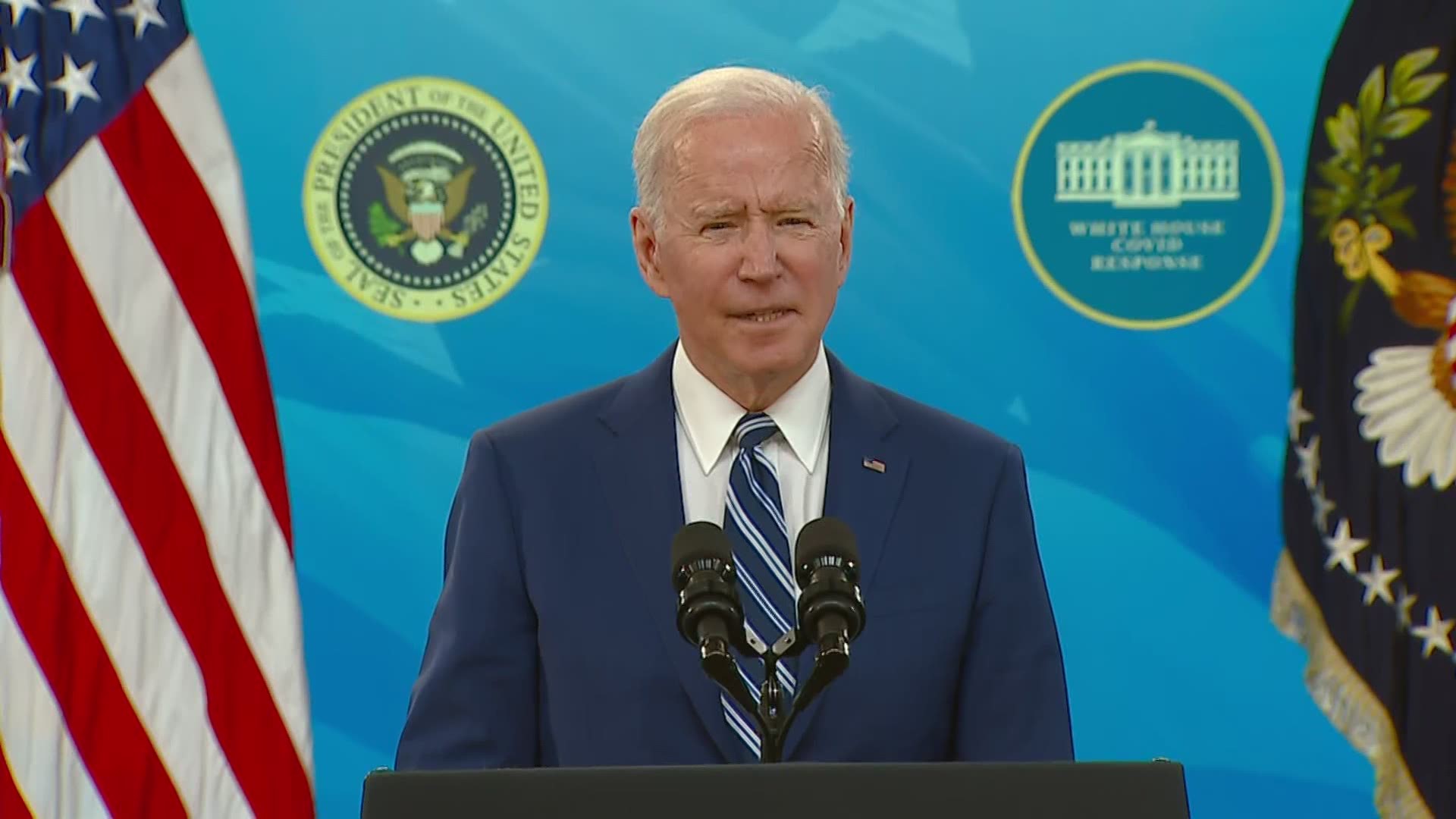WASHINGTON — President Joe Biden announced Monday that by April 19 at least 90% of the adult U.S. population will be eligible for vaccination — and will have access to a vaccination site within 5 miles of their homes. Quick vaccination would still depend on supply as well as overcoming some people's hesitancy about the shots.
Biden has directed that all states make all adults eligible for vaccination by May 1, but many have moved to lift eligibility requirements sooner in anticipation of supply increases.
The White House said it was moving to double the number of pharmacies participating in the federal retail pharmacy program — which has emerged as among the most efficient avenues for administering vaccines — and increase the number of doses for them to deliver. The retail pharmacies are located in close proximity to most Americans and have experience delivering vaccines like the flu shots.
During remarks from the White House, Biden urged all Americans to "mask up" while vaccinations continue and called on governors to reinstate mask mandates.
The announcement came hours after a new Centers for Disease Control and Prevention study released on Monday showed strong evidence that mRNA coronavirus vaccines are "highly effective in preventing SARS-CoV-2 infections in real-world conditions.
The CDC said the study looked at the effectiveness of the Pfizer and Moderna vaccines, the only two mRNA COVID-19 vaccines that received an Emergency Use Authorization from the FDA, among health care personnel, first responders, and other essential workers.
The study said that of the 3,950 participants across six states, their risk of infection was reduced by 90% two or more weeks after receiving the second dose of the vaccine. The first dose lowered the participant's risk of infection by 80% two or more weeks after getting the shot, the study found.
This confirms the findings of the vaccine's Phase 3 trial before receiving authorization in the U.S.
CDC Director Rochelle Walensky highlighted the study's findings, but said she has a feeling of "impending doom" based on rising COVID cases, hospitalizations and deaths.
Officials said Monday morning that Mexico had officially received 1.5 million doses of the AstraZeneca vaccine from the United States. The AstraZeneca shot has not yet been approved for use in the U.S., so the Biden administration recently announced it had agreed to give millions of doses to Mexico and Canada.
The CDC study, which observed the participants over a 13-week period from mid-December to mid-March, also found that about two weeks after each dose of mRNA vaccines, the human body begins to produce antibodies to protect against coronavirus.
“This study shows that our national vaccination efforts are working," CDC Director Dr. Rochelle P. Walensky said in a statement. "The authorized mRNA COVID-19 vaccines provided early, substantial real-world protection against infection for our nation’s health care personnel, first responders, and other frontline essential workers."
The Johnson and Johnson one-dose vaccine, which received emergency use authorization in late February, was not included in the study.
Dr. Walensky added: "These findings should offer hope to the millions of Americans receiving COVID-19 vaccines each day and to those who will have the opportunity to roll up their sleeves and get vaccinated in the weeks ahead. The authorized vaccines are the key tool that will help bring an end to this devastating pandemic.”
The CDC explained that the participants of the study self-collected nasal swabs each week for laboratory testing, regardless if they had symptoms or not. It said that the study "demonstrates that these two mRNA vaccines can reduce the risk of all SARS-CoV-2 infections, not just symptomatic infections."


The study is the first of many on the effectiveness of the COVID-19 vaccines, according to the CDC. Other studies are underway to evaluate the benefits of vaccines in various populations.
Dr. Jill Roberts, a molecular epidemiologist at the University of South Florida says this study was the greatest test for the vaccines because it challenged them in the most high-risk settings. Unlike the initial trials prior to FDA emergency use authorization, this real-world study specifically targeted people who were likely to come in contact with COVID versus random volunteers.
Even more encouraging is proof now that the mRNA vaccines are holding up against the variants and even preventing the spread of COVID-19.
“This is not just preventing hospitalizations and deaths, this is preventing real infection and so that’s breaking it down to transmission. If you cannot get infected, you cannot transmit,” said Dr. Roberts.
The study comes several days after Biden announced that his administration plans to administer 200 million doses of COVID-19 vaccines by his 100th day in office. His original goal of 100 million doses was reached just before his 60th day in office.
For most people, the new coronavirus causes mild or moderate symptoms. For some, especially older adults and people with existing health problems, it can cause more severe illness, including pneumonia and death.
The United States has more than 30 million confirmed cases of COVID-19, according to data from Johns Hopkins University.
As of Monday, the U.S. had nearly 550,000 deaths from the virus. Worldwide, there are more than 2.7 million confirmed cases with more than 2.7 million deaths.
The Associated Press contributed to this report.

